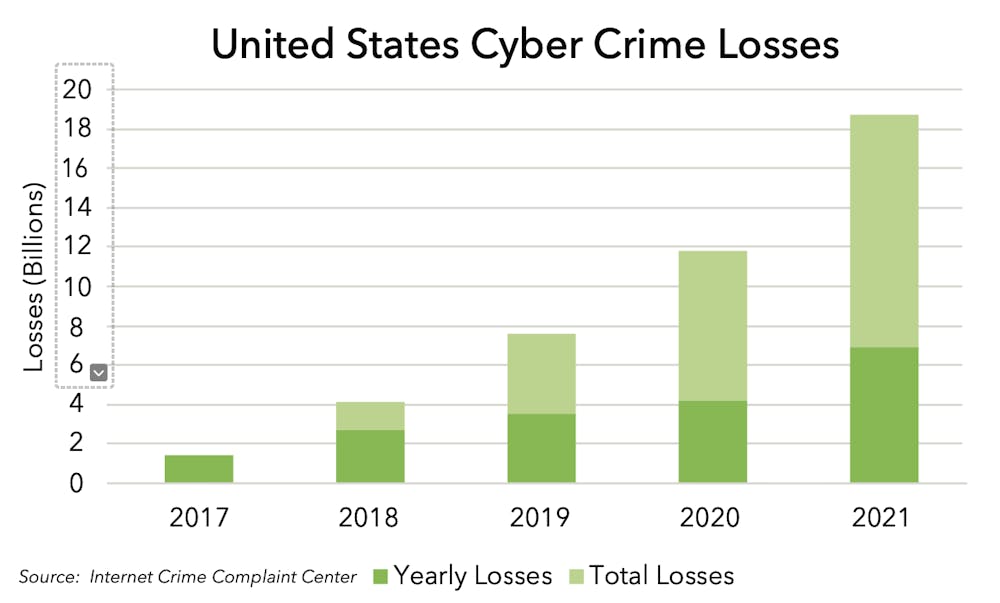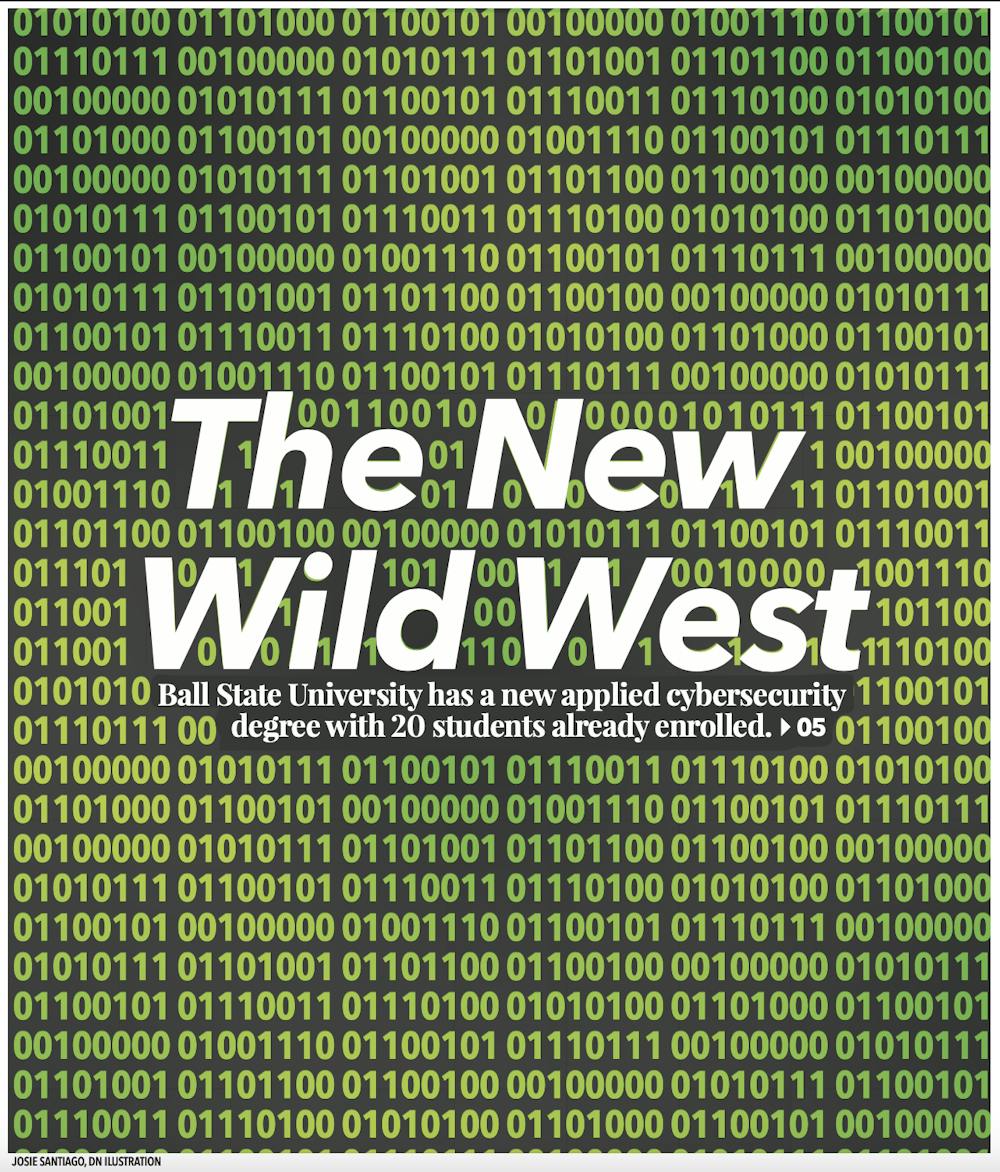Since its creation, the internet has seemingly been a land of possibility, but people were slow to realize possibility is not always benevolent.
According to the 2021 report of the FBI’s Internet Crime Complaint Center (IC3), Indiana alone had 11,399 victims of cyber crime and a total of over $60 million in losses.
However, people are not completely defenseless on the internet with a new rising hero on the scene—cybersecurity.
“Without cybersecurity, the internet would just be the Wild West,” Sam Looney, a second-year applied cybersecurity major, said. “It is essential to a functioning internet, which is essential to a functioning world nowadays.”
Looney is one of more than 20 students in Ball State University’s new major, applied cybersecurity, that rolled out last fall. The idea for the major, however, started much earlier.
David Hua, associate director of undergraduate programs and interim director of the Center for Information and Communication Sciences at Ball State, and Lt. Colonel Kelly Rosenberger, former chair of Ball State’s military science department, began talking about creating a cybersecurity major over six years ago. Originally, the idea was for cadets to be trained for the U.S. Army’s new cyber command division, Hua said.
“Last summer, we finally got approval from the state to offer the new applied cybersecurity degree, both as an on-campus major as well as an online only major,” Hua said. “By the beginning of fall semester, without any advertising, we already had [a] little over 20 enrolled [people] in the program.”
Cybersecurity, along with its other STEM counterparts, often gets put into a box, but Hua is seeking to do just the opposite with students.
“A big part of what we're going to be trying to do with the students is to get them to think outside the box all the time,” Hua said. “Maybe not even pay attention to the most obvious path. Not to ignore it, but when you're looking at it from an attacker's perspective, you're trying to find all these other ways things can be done.”

What exactly does that mean?
As Hua explained, if someone is looking to get to a restaurant in town for dinner, how many paths are there from campus? The job of the major is finding all possible routes to the destination.
From the attacker’s perspective, it is finding a path that may not be defended well. From the defense, it is finding every possible route and increasing defenses before the attacker finds them first.
The game is high stakes, which is why Hua implemented a competition each semester for students to test their skills in a simulated situation. For those in the major, they are required to participate, but few seem to be complaining.
“It has you try and crack passwords and crack ciphers,” Looney said. “It is super interesting. I've only been to one training session, but I'm super excited.”
Another applied cybersecurity first-year student, Ke’Juan Smith, who is a part of the group that Hua helps practice for the competition, shared Looney’s excitement.
“I am actually excited about it,” Smith said. “[Hua] wants to do some courses and help us practice, and I really appreciate that. I just gotta find time in my schedule to actually go, but I plan on it.”
The competition is not just for applied cybersecurity majors, especially as some have already been participating. Brooke Bonek, third-year computer technology major with minors in business administration and technical theatre, is especially involved with these competitions as the vice president of the Computer Technology Student Organization.
“You're basically put into a scenario that you would actually do in real life,” Bonek said. “You're assigned a task by the group that runs the competition, and you have to analyze this network traffic page or look at this website and figure out how you can exploit it if you're doing more of an offensive security type thing. It shows you what you expect to do when you actually go out into the real world and do your job.”
The competition by the National Cyber League (NCLA) creates “a safe environment for students to practice their cybersecurity skills,” according to their website
There is still an understanding of the importance of the craft, and the demand for cybersecurity is high. With that, there are benefits.
“There's the stereotypical image of this lone person sitting alone in a dark space with a hoodie on typing code outs, and while there's still some of that, that's not the majority of what's happening anymore. It's organized crime,” Hua said. “It's being organized by nation states. We've got cyber warfare occurring between countries. There is a huge demand globally, and job potential is just enormous. If you have any kind of cyber skills, especially if you're willing to relocate, you can go just about anywhere.”

The stereotypes of this rising industry have led to a glass ceiling, as women and people of color are often not as represented. Hua explained his hope for the future of the program as he looks at his first class of cybersecurity majors, who are beyond the imagery of white young men in hoodies behind a computer.
According to a 2018 study by the Information Systems Audit of Control Association (ISACA), an organization focused on the industry, they found that those who do not identify as white or Caucasian make up only 26 percent of the cybersecurity workforce. Women in the field make up little more than half of that number at 14 percent of the workforce.
“It's been a lot of just myself, or like there's been one or two other girls on the very first day, and then they end up dropping out,” Bonek said. “I've learned how to stick through it and make sure I can show these guys that not just guys can do it. I definitely feel like I've been able to show what I can do.”
Smith also shared his own frustrations and hopes for the future of diversity for the field.
“I've seen a wide array of people that are not the usual archetype in this field,” Smith said. “I feel like it should be like that. Every field should be able to have that flexibility and not be constrained to only, ‘You can have that job, or you can have this job.’ You should have whatever job you want to be in with the field you choose.”
Smith also had a piece of advice for any student interested in the field.
“Especially early on, if you're struggling, really try to persevere. Stick it out because it's a payoff thing,” Smith said. “If you like math, it's kind of like that. It requires a lot of critical thinking, and when you finally figure out the solution to a problem, it's very satisfying. If you like that kind of thing, you should really stick with this major.”
Students interested in the on-campus or online cybersecurity major can find more information at Ball State’s website. Students of all majors interested in participating in the NCLA competition can contact Hua for more information.
Contact Abigail Denault with comments via email at abigail.denault@bsu.edu.





